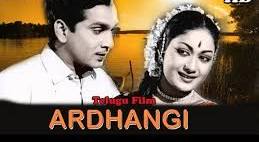In the illustrious tapestry of Telugu cinema, a timeless classic emerged in the form of “Ardhangi,” a captivating drama that unfolded on the silver screen in 1955. Let’s step back in time and explore the essence of this cinematic gem.
Crafted under the creative vision of director P. Pullayya, and brought to life by the compelling screenplay of Acharya Aatreya, “Ardhangi” is a narrative woven from the threads of Manilal Banerjee’s novel, ‘Swayamsiddha.’ The film graced the audience under the banner of Ragini Pictures.
The captivating performances of the stellar cast, including Santha Kumari, Savitri, and Akkineni Nageswara Rao, breathed life into the characters. The lens of Madhav Bulbule captured the visual nuances, while the rhythmic melodies by Master Venu and B. Narasimha Rao resonated with the soul of the narrative.
The tale unfolds as Zamindar Bhujangarao navigates the complexities of family dynamics, having two sons from different wives. The elder son, Raghunath Rao, faces developmental challenges, while the younger son, Nagendra Rao (Naagu), embodies vices. The plot thickens as the Zamindar’s decision to arrange Naagu’s marriage takes unexpected turns, leading to alliances and betrayals.
At the core of the story is Padma, a village girl, who, impressed by her resilience, becomes an integral part of the family dynamics. As relationships evolve and secrets unravel, “Ardhangi” delves into themes of familial bonds, love, and the consequences of one’s actions.
The film’s emotional crescendo is heightened by the soul-stirring soundtrack, featuring melodies like “Intiki Deepam Illale” and “Pelli Muhurtham Kudirindha,” adorned with the lyrical finesse of Acharya Aatreya.
“Ardhangi” not only resonated with the audience but also garnered critical acclaim. It clinched the National Film Award for Best Feature Film in Telugu and the Filmfare Award for Best Film – Telugu. The film’s success echoed beyond linguistic boundaries, leading to remakes in Tamil as “Pennin Perumai” and in Hindi as “Bahurani” in 1963.
As the reels of time unfold, “Ardhangi” stands as a testament to the enduring legacy of Telugu cinema. Its impact echoed in the accolades it received and the hearts it touched during its theatrical run of over 100 days in multiple centers across Andhra Pradesh.
In the vast cinematic landscape, “Ardhangi” remains a timeless chapter, reminding us of the power of storytelling and the indelible mark it can leave on the hearts of generations.

